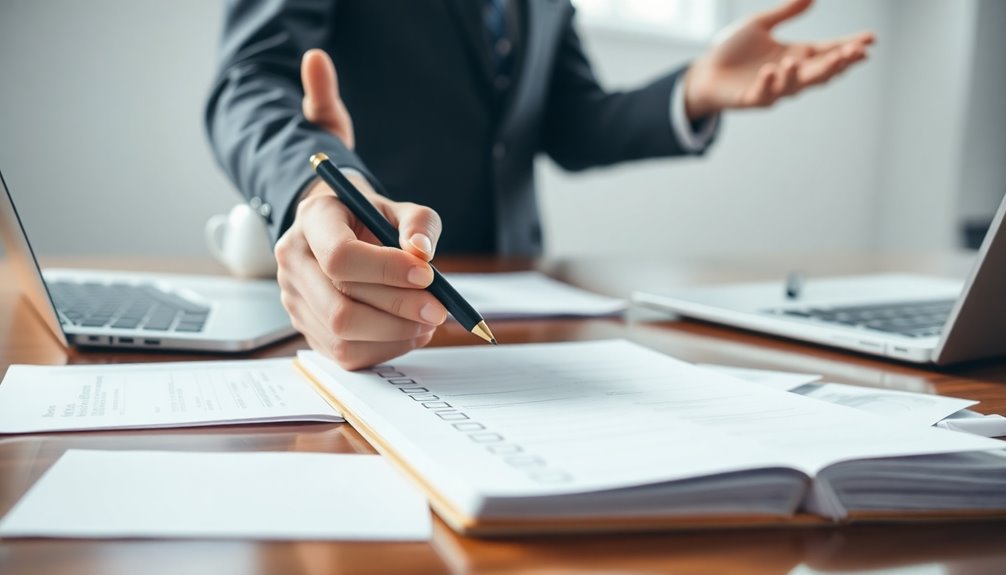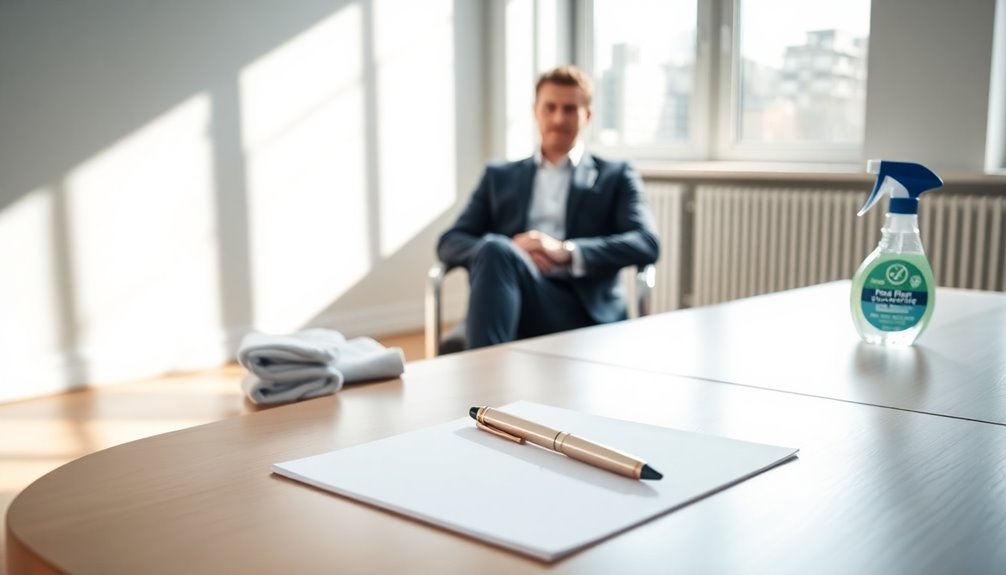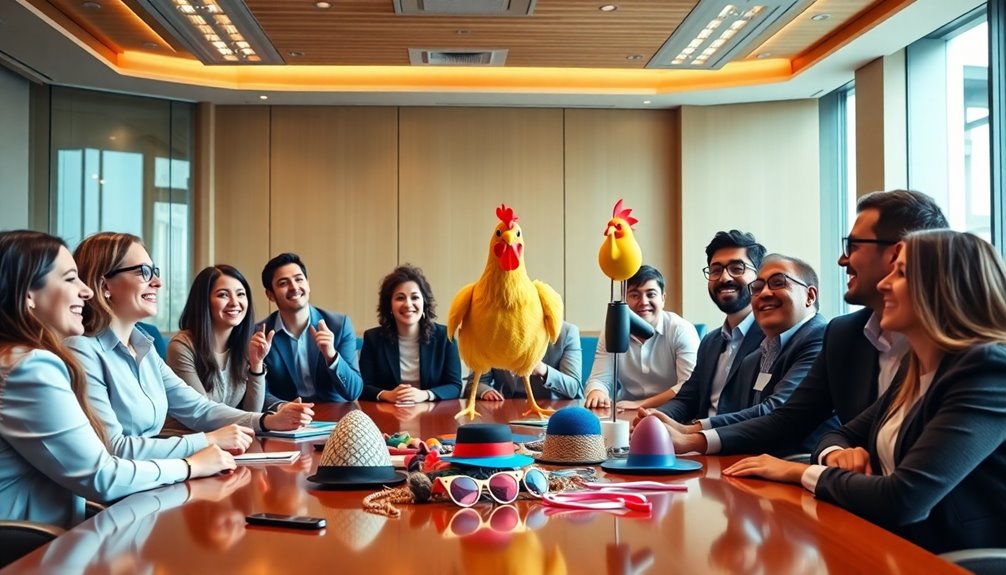Mastering the art of job interviews starts with your preparation. Spend time researching the company and the role, and have your documents ready. Practice common questions to boost your confidence. During the interview, engage actively and ask targeted questions that align with the job's requirements. Afterward, reflect on your performance and consider how well you matched the role's expectations. Avoid common pitfalls like inadequate preparation or relying on gut feelings. By sharpening these skills, you can enhance your interviewing techniques considerably—discover ways to further refine your approach and navigate the interview landscape smoothly.
Key Takeaways
- Thoroughly research the company and role to align your responses with their culture and expectations.
- Prepare and practice common interview questions to boost confidence and structure your answers.
- Engage actively with candidates by asking targeted questions to assess qualifications and experiences effectively.
- Implement a structured rating system to ensure consistent evaluations across all candidates.
- Review notes and solicit diverse perspectives from the hiring team for a well-rounded assessment.
Importance of Job Interviews

Understanding the importance of job interviews is essential for both employers and candidates. They serve as a significant step in ensuring that qualified candidates fill open positions.
Through interviews, you can engage in meaningful conversations that go beyond what's on a resume, allowing for a deeper understanding of each other's expectations and capabilities. This process not only helps you eliminate unsuitable candidates but also saves time and resources in the long run.
For employers, interviews are a common practice, providing a structured approach to assess candidates effectively. For candidates, it's an opportunity to showcase skills and ask critical questions about the role and company culture, fostering a mutual understanding that's key to a successful hire.
Preparing for the Interview

Once you've grasped the importance of job interviews, the next step is preparing for them effectively. Start by allocating at least 30 minutes to gather your thoughts and materials.
Research the company and the role thoroughly; understanding the organization's culture will give you an edge. Have your resume and any relevant documents ready, and be prepared to discuss your experiences in detail.
Define what makes an ideal candidate for the position, as this will help you align your answers with the employer's expectations.
Finally, practice common interview questions, maintaining a consistent structure in your responses. This preparation won't only boost your confidence but also demonstrate your commitment to the opportunity at hand.
Conducting the Interview

Conducting an effective interview requires a blend of engagement and clarity. You need to actively engage with the candidate to assess their suitability for the role. Start by asking targeted questions related to their qualifications and experiences. This helps you gauge if they align with your needs.
Don't forget to clarify job requirements and expectations, ensuring the candidate understands what's at stake. As you navigate through the interview, take detailed notes to capture key points for reference later.
Implementing a structured rating system can help you evaluate each candidate consistently, minimizing biases. This approach not only streamlines your decision-making process but also enhances the overall interview experience for both you and the candidate.
Post-Interview Evaluation

After the interview wraps up, it is crucial to assess each candidate's performance thoughtfully. Review your notes and ratings, focusing on how each candidate aligns with your established criteria. Comparing qualifications not only sharpens your decision-making but also guarantees a fair evaluation process. Additionally, considering emotional intelligence can provide insights into a candidate's adaptability and team management skills.
| Evaluation Criteria | Candidate 1 | Candidate 2 |
|---|---|---|
| Communication Skills | 4/5 | 3/5 |
| Relevant Experience | 5/5 | 4/5 |
| Cultural Fit | 3/5 | 5/5 |
Discuss your impressions with the hiring team to gather diverse perspectives. By making informed decisions based on structured assessments, you can communicate outcomes to candidates promptly, fostering a positive experience regardless of the result.
Common Interviewing Mistakes

Many hiring managers unknowingly fall into common interviewing mistakes that can undermine the selection process.
These errors can lead to poor hiring decisions and wasted resources.
Here are three pitfalls to avoid:
- Inadequate Preparation: Not researching candidates or defining criteria beforehand can leave you unprepared.
- Bias Influence: Allowing personal biases to cloud your judgment may result in unfair evaluations.
- Vague Questions: Asking generic or irrelevant questions fails to reveal a candidate's true qualifications.
Frequently Asked Questions
What Types of Questions Should Candidates Ask During an Interview?
When you're in an interview, it's essential to ask insightful questions. You might want to inquire about the company culture, team dynamics, or what a typical day looks like in the role.
Consider asking about growth opportunities and how success is measured. This not only shows your interest but helps you evaluate if the position aligns with your career goals.
How Should Candidates Dress for a Job Interview?
Dressing for a job interview is like putting on your armor for battle. You want to present yourself as professional and confident.
Choose attire that aligns with the company's culture—business formal for corporate roles or smart casual for creative environments. Guarantee your clothes are clean, pressed, and fit well.
Don't forget about grooming; neat hair and subtle accessories can make a lasting impression.
What Should Candidates Bring to the Interview?
When you head to a job interview, make sure you bring a few essential items.
Have extra copies of your resume handy, along with a list of references.
Don't forget a notebook and pen to jot down important points.
If applicable, bring a portfolio showcasing your work.
Also, consider having questions prepared to ask the interviewer.
Being organized and prepared shows your professionalism and enthusiasm for the position.
How Can Candidates Follow up After an Interview?
Following up after an interview is like sending a thank-you note after a dinner party; it shows appreciation and keeps you on their radar.
You can send a brief email within 24 hours, expressing gratitude for the opportunity and reiterating your enthusiasm for the role.
Mention something specific from the interview to jog their memory.
This small gesture can leave a lasting impression and help you stand out among other candidates.
What Should Candidates Do if They Feel Nervous?
If you feel nervous before an interview, take a moment to breathe deeply and center yourself.
Visualize a positive outcome and remind yourself of your qualifications.
Practice your responses to common questions aloud to build confidence.
Arrive early to the interview location, giving yourself time to acclimate.
Remember, it's a two-way conversation.
Focus on engaging with the interviewer, and you'll find your nerves start to settle as the discussion progresses.
Conclusion
In the intricate dance of job interviews, each step you take can lead to a harmonious partnership or a misstep in the rhythm. By preparing diligently, conducting the interview with grace, and reflecting on the experience, you weave a tapestry of connection and understanding. Remember, every interview is a bridge—one that can lead you to new opportunities or valuable lessons. Embrace the journey, and let your confidence shine as you navigate this pivotal moment in your career.









